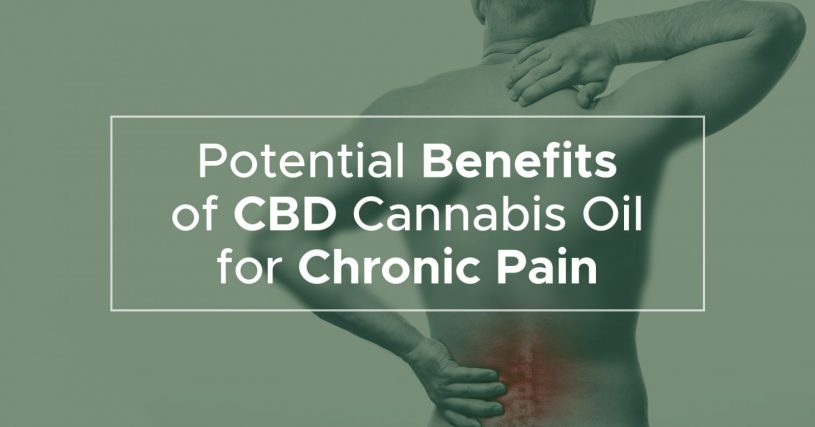By now you must have heard that CBD can effectively help in reducing chronic pain and inflammation. CBD or cannabidiol is one of the natural phytocannabinoid extracted from different strains of cannabis.
It is preferred to be sourced from industrial hemp as it contains a negligible quantity of THC or Tetrahydrocannabinol. THC is the main intoxicating component of marijuana which can cause mind-altering effects.
Most people use CBD oil to seek relief from pain caused by:
- Cancer pain
- Multiple sclerosis pain
- Fibromyalgia
- Migraines
- Neuropathic pain
- Osteoarthritis
- Headaches
- Irritable bowel syndrome (IBS)
- Low back pain
Even though most over the counter medications including non-steroidal anti-inflammatory drugs and opioids are more effective and quicker than CBD but they also come with severe side effects. If you are searching for a herb, supplement or natural remedy for pain relief, CBD is the answer.
How CBD works in our body
Research has shown that CBD works by interacting with the endocannabinoid system. The endocannabinoid system is a link between our body and mind. CB1 and CB2 receptors are spread across the body and brain offering binding sites to endogenous cannabinoids. Just like these endocannabinoids, exogenous cannabinoids can also interact with these receptors to boost the activity of the endocannabinoid system. Research has shown that ECS is responsible for managing pain and inflammation. CBD can interact with the TRPV1 pain receptors to alter pain perception and reduce discomfort by folds.
CBD has been found to be quite effective for reducing neuropathic pain which is usually caused by different health conditions such as multiple sclerosis and diabetes.
Cannabis based medicines can treat neuropathic pain and reduce its intensity. It can also help with sleep problems and physiological distress. However, it should be noted that CBD may not be able to treat the underlying cause of pain which is why you need to visit your healthcare practitioner to treat the disorder causing pain.
The exact effect of the CBD dose depends on its bioavailability. Oral CBD dose could be less effective but works better for generalized pain. The topical application of CBD has proven to be best for localized pain and inflammation.
CBD for Chronic pain. Conclusions of scientific research
Since the year 2000, studies suggest that the use of CBD to reduce chronic pain may be an effective phytocannabinoid. Many of these studies were conducted to the highest standards in double-blind and placebo-controlled groups.
The studies were performed in patients diagnosed with multiple sclerosis, spinal injuries, brachial plexus lesions and amputations of the limbs, kidney transplants, or those suffering from neuropathy of the lower extremities. Treatment with CBD significantly reduced pain (Wade 2003) (Cunetti 2018) (Xu 2019).
In fibromyalgia patients, CBD reduced pain by a 30 percent higher proportion of patients compared with the placebo group (Van De Donk 2019).
Studies of generalized pain relief using CBD have not shown significant results, but patients have reported improvements in their sleep and overall quality of life.
It is necessary to understand that CBD cannot help everyone and always. Studies on the benefits of CBD in reducing pain caused by Crohn’s disease have not shown positive results (Naftali 2014).
Minor phytocannabinoids, terpenes, and flavonoids
Other cannabinoids found in cannabis can also provide many benefits. Cannabichromene CBC is the third most common cannabinoid found in cannabis. It has anti-inflammatory properties (Wirth 1980), Cannabigerol CBG, has analgesic properties. Terpene Myrcene acts as an analgesic.
Terpene Beta caryophyllene reduces inflammation and acts as a gastric cytoprotector. It is a selective CB2 receptor agonist (Gertsch 2007).
The terpene linalool has the potential for use as an analgesic for local pain (Re 2000).
The flavonoid Apigenin is known to inhibit the mechanisms of multiple sclerosis and arthritis. Cannaflavin A is unique to cannabis plants. PGE-2 inhibits thirty times more effective than aspirin (Barret 1986).
Beta-sitosterols and phytosterols found in cannabis in research 65 percent reduced local inflammation and 41 percent chronic edema (Gomez 1999).
Full-spectrum cannabis products contain hundreds of substances that work together to provide a stronger therapeutic effect. In order to reap the full benefits of cannabis products, it is essential to choose the right product for you and use it properly.
References:
Corroon, J., & Felice, J. F. (2019). The Endocannabinoid System and its Modulation by Cannabidiol (CBD). Alternative Therapies in Health & Medicine, 25.
Anand, U., Jones, B., Korchev, Y., Bloom, S. R., Pacchetti, B., Anand, P., & Sodergren, M. H. (2020). CBD Effects on TRPV1 Signaling Pathways in Cultured DRG Neurons. Journal of Pain Research, 13, 2269.
Boyaji, S., Merkow, J., Elman, R. N. M., Kaye, A. D., Yong, R. J., & Urman, R. D. (2020). The role of cannabidiol (CBD) in chronic pain management: an assessment of current evidence. Current pain and headache reports, 24(2), 1-6.
Urits, I., Gress, K., Charipova, K., Habib, K., Lee, D., Lee, C., … & Viswanath, O. (2020). Use of cannabidiol (CBD) for the treatment of chronic pain. Best Practice & Research Clinical Anaesthesiology.
References
Corroon, J., & Felice, J. F. (2019). The Endocannabinoid System and its Modulation by Cannabidiol (CBD). Alternative Therapies in Health & Medicine, 25.
Anand, U., Jones, B., Korchev, Y., Bloom, S. R., Pacchetti, B., Anand, P., & Sodergren, M. H. (2020). CBD Effects on TRPV1 Signaling Pathways in Cultured DRG Neurons. Journal of Pain Research, 13, 2269.
Boyaji, S., Merkow, J., Elman, R. N. M., Kaye, A. D., Yong, R. J., & Urman, R. D. (2020). The role of cannabidiol (CBD) in chronic pain management: an assessment of current evidence. Current pain and headache reports, 24(2), 1-6.
Urits, I., Gress, K., Charipova, K., Habib, K., Lee, D., Lee, C., … & Viswanath, O. (2020). Use of cannabidiol (CBD) for the treatment of chronic pain. Best Practice & Research Clinical Anaesthesiology.
Our Products
CBD Cannabis Oil in MCT 10 % 3000 mg 30 ml
114.95€ 114.95€Read moreA bottle of CBD Cannabis 10 % 3000 mg CBD 30 ml oil (with a small pipette). Made from certified, hand-picked and organically grown cannabis mixed with coconut oil (MCT) for better absorption of cannabinoids.
This phytocannabinoids extract is a full spectrum extract, professionally made and laboratory-tested to ensure the highest quality and safety.
Discount applies when purchasing more:
CBD Cannabis Oil in MCT 10 % 1000 mg 10 ml
Original price was: 46.59€.39.60€Current price is: 39.60€. 39.60€Add to cartA bottle of CBD Cannabis 10 % 1000 mg CBD 10 ml oil (with a small pipette). Made from certified, hand-picked and organically grown cannabis mixed with coconut oil (MCT) for better absorption of cannabinoids.
This phytocannabinoids extract is a full spectrum extract, professionally made and laboratory-tested to ensure the highest quality and safety.
Discount applies when purchasing more:
CBD Cannabis Oil in MCT 5% 1500 mg 30 ml
Original price was: 68.01€.57.80€Current price is: 57.80€. 57.80€Add to cartA bottle of CBD Cannabis oil (with a small pipette). Made from certified, hand-picked and organically grown cannabis mixed with coconut oil (MCT) for better absorption of cannabinoids.
This phytocannabinoids extract is a full spectrum extract, professionally made and laboratory-tested to ensure the highest quality and safety.
Discount applies when purchasing more:
CBD Capsules 750 mg
Original price was: 51.00€.43.35€Current price is: 43.35€. 43.35€Add to cartHigh-grade CBD / CBDA capsules professionally made and laboratory-tested to ensure the greatest quality and safety.
This product is suitable for those who want to avoid the specific taste of cannabis extracts. Nothing needs to be dosed, we’ve already done it for you.
Discount applies when purchasing more:
Hemp Oil for Pets 250 mg CBD 10 ml (2 bottles)
Original price was: 29.00€.24.65€Current price is: 24.65€. 24.65€Add to cartWe Are Canna full-spectrum CBD oil for pets is a completely natural, excellent source of vitamins and Omega fatty acids.
We all want our pets to be healthy and beautiful. Let’s take care of them by incorporating high-quality CBD products into their daily diet.
CBD soap 100g / 100mg CBD
Original price was: 9.99€.8.99€Current price is: 8.99€. 8.99€Read moreWe Are Canna CBD body soap is another unique, natural, handmade cannabis product made only from the highest quality ingredients, free from GMOs or other harmful substances.
Thanks to the knowledge passed down from generation to generation, the plant that humanity has used for thousands of years and modern technology, we are able to experience what is real, natural, tested and appreciated. CBD soap is made using a 100-year-old manufacturing methodology, which makes this product even more special.
The phytocannabinoids and terpenes in CBD soap, acting in synergy, will give your skin a variety of therapeutic properties, not to mention the pleasant aroma that will captivate everyone. From now on, bathing rituals will be different!







2 Comments